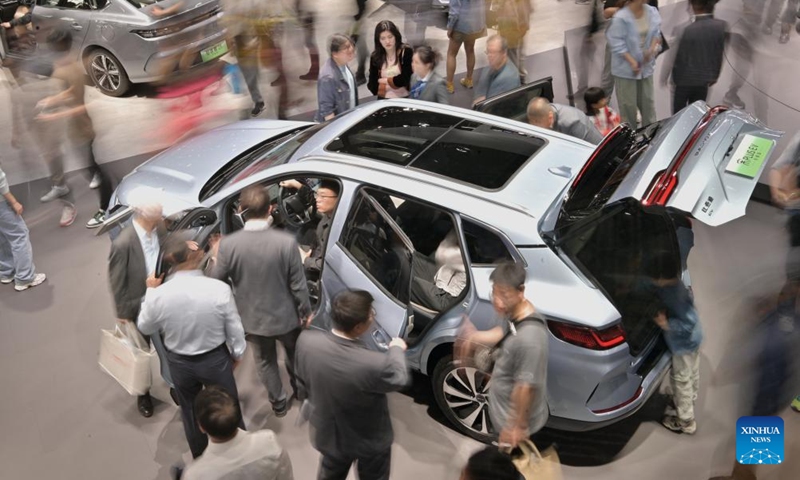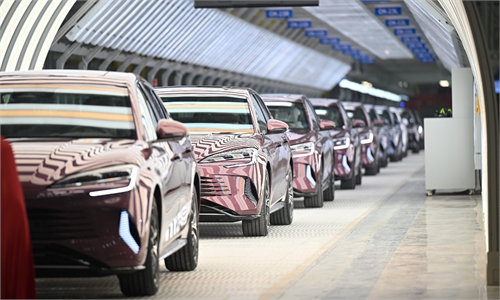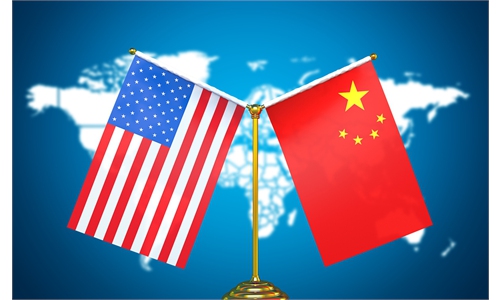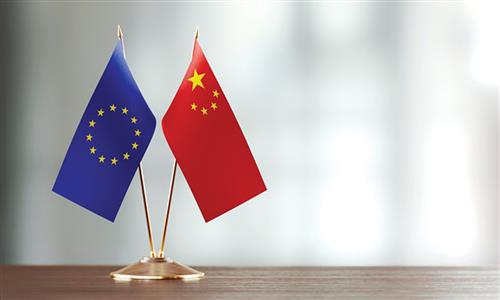China moving ahead with procedure to raise temporary tariff rate on imported cars with large engines: report

Visitors watch a vehicle of Song PLUS by Chinese NEV manufacturer BYD during the 2024 Beijing International Automotive Exhibition in Beijing, capital of China, May 4, 2024. Photo: Xinhua
Chinese industries have voiced strong opposition to the European Commission (EC)'s decision to impose additional provisional tariffs on Chinese battery electric vehicles (EVs) imports, and called on relevant departments to take countermeasures against the EU move, according to a report in a social media account under China Media Group.
According to industry insiders, China is internally moving ahead with the procedure to raise the temporary tariff rate on imported cars with large-displacement engines, Yuyuantantian, the social media account, reported on Thursday.
A Chinese auto industry insider has previously told the Global Times that China should consider raising the temporary tariff rate on imported cars with engines larger than 2.5 liters, and said China's temporary tariff rate on imported vehicles could be raised to a maximum of 25 percent. The insider said that such a move would be not only in line with WTO rules, but also in line with China's broader efforts to promote the green transition in the auto industry and pursue the goal of reducing carbon emissions.
The Yuyuantantian report also said that the Chinese industries called for raising tariffs on imported cars with large-displacement engines to up to 25 percent. Such a move conforms to WTO rules since it's within the scope of China's WTO commitment, said Cui Fan, a professor at the University of International Business and Economics, in the report.
"China has sufficient tools and measures before a final decision by the EU is made," Cui was quoted as saying, adding that China could lodge lawsuits under the dispute settlement mechanism of the WTO.
According to calculation by the China Passenger Car Association, the EU exports a total of $18 billion worth of cars with large-displacement engines to China each year, which is higher than the value of EVs China exported to the EU in 2023.
If China raises temporary tariffs, EU brands like BMW and Mercedes-Benz will bear the brunt and the EU's car exports to China will also be impacted, according to the yuyuantantian report.
Yuyuantantian also reported that the preliminary ruling of the anti-dumping probe into imported brandy from the EU is expected to be announced by the end of August, citing industry experts familiar with the probe.
In January, China's Commerce Ministry announced an anti-dumping probe into imported brandy from the EU following a request from the China Alcoholic Drinks Association on behalf of the domestic industry.
According to customs data, the EU's brandy exports to China jumped by over 20 percent between January and September in 2023, as China has become an important market amid EU brandy's notable sales decrease in other countries.
In response to the decision of the EC, the EU's executive arm, officials from Chinese Foreign Ministry, National Development and Reform Commission (NDRC) and Commerce Ministry said China will closely monitor developments in the EU, vowing "necessary measures" to firmly defend the legitimate rights and interests of Chinese companies.
The Chinese car industry has clear and sufficient legal basis to oppose the tariff hikes, as all the links of the case - from the EC's launch of an anti-subsidy probe into Chinese EVs to the investigation process and disclosure of provisional tariffs - are unreasonable, said Yuyuantantian's report.
In October 2023, the EC initiated an anti-subsidy investigation into the EU's imports of EVs from China, as the commission subjectively considers that Chinese EV industry poses a "threat."
Applications for anti-subsidy probes are basically filed by industries, since only industries can directly sense potential threats that a country's products pose to them and then file a petition for investigations out of considerations of their own interests, Sun Xiaohong, secretary-general of the automotive branch of the China Chamber of Commerce for Import and Export of Machinery and Electronic Products (CCCME), was quoted as saying.
"In history, there is almost no case where the EC initiated an anti-subsidy investigation," Sun said in the report.
The CCCME said that the EC's investigation into Chinese EVs "lacks fairness, objectivity and transparency."
The EC does not give a compelling reason on why it took the aim at SAIC Group, BYD and Geely. Citing industry data, the report said Chinese brands take around 8 percent market share in the Europe's EV market, while the three companies take even less market share.
The EC's sampling standards are non-compliant, the procedure is opaque and the result is unfair, Hao Jie, a research fellow with the Institute for International Economic Research of the NDRC, was quoted as saying.
In order to fabricate and exaggerate so-called "subsidies," the EC has disregarded WTO rules by purposely excluding companies from the EU and the US that export more cars in its sampling while only target Chinese local companies, according to Hao.
With no sufficient facts backing its claim of "threat" from Chinese EV enterprises, the EC, however, has made extremely harsh demand on these Chinese companies during the investigation, the report said.
Chinese companies said the EC asked them to provide the ingredient of their batteries, and much other information involving business secrets and core technologies, Sun said in the report.
Even more unreasonable and opaque is that the EU uses information that they collected themselves to make up for the data that they couldn't get from Chinese companies, and do not care whether the data is objective and true, Sun was quoted as saying.
In multiple rounds of investigations and hearings, the EC never considered the stance and concerns of the Chinese side. "It seems that they do not care about communication, and their only focus is to complete the investigation to achieve what they want to do," Sun said.
The Chinese Foreign Ministry vowed on Thursday that all "necessary measures," will be taken. "China must safeguard WTO rules and market principles and must protect the legitimate rights and interests of the Chinese EV industry and its enterprises," said a spokesperson with the ministry at a regular press conference.



